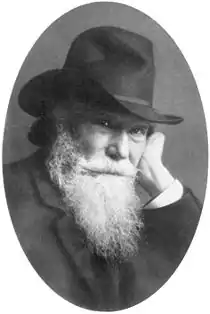Karl Joseph Eberth | |
|---|---|
 | |
| Born | 21 September 1835 Würzburg, Germany |
| Died | 2 December 1926 (aged 91) |
| Alma mater | University of Würzburg |
| Known for | Discovery of the typhoid bacillus |
| Scientific career | |
| Fields | Bacteriology, pathology |
| Doctoral students | Oswald Bumke |
Karl Joseph Eberth (21 September 1835 – 2 December 1926) was a German pathologist and bacteriologist who was a native of Würzburg.
Biography
In 1859 he earned his doctorate at the University of Würzburg, and became an assistant to anatomist Albert von Kölliker (1817–1905). In 1869 he became a full professor of pathological anatomy at the University of Zurich, and from 1881 until his retirement in 1911, he was a professor at the University of Halle.
In 1880 Eberth described a bacillus that he suspected was the cause of typhoid.[1] In 1884 pathologist Georg Theodor August Gaffky (1850–1918) confirmed Eberth's findings,[2] and the organism was given names such as "Eberthella typhi", "Eberth's bacillus" and "Gaffky-Eberth bacillus". Today the bacillus that causes typhoid fever goes by the scientific name of Salmonella enterica subspecies enterica serovar Typhi.[3][4]
Associated eponyms
- "Eberth's lines": Microscopic lines that appear between the cells of the myocardium when stained with silver nitrate.[5]
- "Eberth's perithelium": an incomplete layer of connective tissue cells encasing the blood capillaries.[6]
Selected works
- Untersuchungen über nematoden, (Leipzig : W. Engelmann, 1863).
- Zur Kenntnis der Bacteritischen Mykosen, (Leipzig : Engelmann, 1872).[7]
- Zur kenntniss der blutplättchen bei den niederen wirbelthieren, (Leipzig, Engelmann, 1887).
- Die Thrombose nach Versuchen und Leichenbefunden, with Curt Schimmelbusch, (Stuttgart, 1888).
- Die männlichen Geschlechtsorgane, (Jena, Fischer, 1904).[8]
See also
References
Parts of this article are based on a translation of an article from the German Wikipedia.
- ↑ See:
- C. J. Eberth (1880) "Die Organismen in den Organen bei Typhus abdominalis" (Organisms in the [internal] organs in cases of Typhus abdominalis), Archiv für pathologische Anatomie und Physiologie, 81 : 58–74.
- C. J. Eberth (1881) "Neue Untersuchungen über den Bacillus des Abdominaltyphus" (New investigations into the bacilli of abdominal typhoid), Archiv für pathologische Anatomie und Physiologie, 83 : 486–501.
- Eberth's findings were verified by Robert Koch: Koch, Robert (1881) "Zur Untersuchung von pathogenen Organismen" (On the investigation of pathogenic organisms), Mitteilungen aus dem Kaiserlichen Gesundheitsamte, 1 : 1–49 ; see p. 45.
- ↑ Gaffky (1884) "Zur Aetiology des Abdominaltyphus" (On the etiology of abdominal typhus), Mittheilungen aus dem Kaiserlichen Gesundheitsamte, 2 : 372-420.
- ↑ Physician and surgeon, Volume 14 by J. W. Keating
- ↑ Journal of Nepal Health Research Council Vol.3 No.2 October 2005 Archived 3 March 2016 at the Wayback Machine Antibiotic Sensitivity Pattern of Salmonella Species Isolated from Blood Culture
- ↑ Mondofacto Dictionary Archived 2016-03-03 at the Wayback Machine (definition of eponym)
- ↑ Mondofacto Dictionary Archived 2016-03-03 at the Wayback Machine (definition of eponym)
- ↑ IDREF.fr bibliography
- ↑ The Online Books Page published works